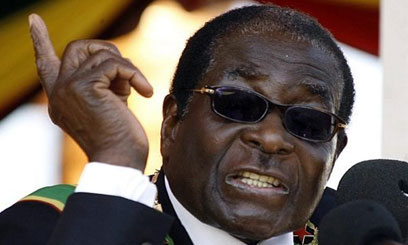
President Robert Mugabe’s pronouncement on Sunday that the economy is on the rebound shows he is living in a world of his own.
NewsDay Editorial
Addressing guests at the 2014 President’s Medal Shoot competition at Cleveland Range in the capital, Mugabe sought to reassure the nation that the country’s economy was on a recovery path.
He said his government was going to employ several measures aimed at achieving desired results, adding that the much-touted economic blueprint Zimbabwe Agenda for Socio-Economic Transformation (ZimAsset )was among his key strategies.
But a cursory look at the forces at play in the economy paints a completely different picture. For all intents and purposes government is broke; this fact stands out not only by government’s failure to pay its workers on time, but also by the tax-collector’s frantic efforts and often high-handed methods of collecting taxes.
ZimAsset has become something of a myth; everyone in government talks about how it is the panacea to Zimbabwe’s problems without saying quite how.
We know for example that $27 billion would be needed to properly finance it. Government simply doesn’t have that kind of money; it does not fall from trees. Mugabe had pinned his hopes on the mining sector, particularly on the proceeds from the Chiadzwa diamond fields.
Nothing much seems to be coming out of the fields. Gold, which was superfluously abundant in Zimbabwe, was another source of hope, but leakages have ensured very little trickles into central government coffers. It is said Zimbabwe loses anything to the tune of $400 million in smuggled gold every year.
- Chamisa under fire over US$120K donation
- Mavhunga puts DeMbare into Chibuku quarterfinals
- Pension funds bet on Cabora Bassa oilfields
- Councils defy govt fire tender directive
Keep Reading
Our agricultural sector is still comatose due to inadequate funding and lack of requisite skills. There is some hope in tourism where more arrivals are being recorded although these are still far from the levels that would make a difference to government coffers.
Although Mugabe was forthright in touting the turnaround, he has failed to address the issues that negatively affect the country’s road to prosperity.
One of these major issues is the reluctance of investors to pour in money into the economy. It would seem only a good injection of foreign money would lift the economy in the short term.
But this cannot be possible when potential investors don’t feel their money would be safe in the hands of a government which has a history of grabbing resources and assets it doesn’t own.
In a very blatant sense, ZimAsset is contradicted left, right and centre by government policies such as the Indigenisation and Economic Empowerment Act.
This doesn’t in any way suggest the indigenisation policy is inherently flawed, but that it has to be implemented properly and consistently.
It has also been suggested that the economy has been “informalised”; how much money exactly is in the informal sector is only a subject of conjecture?
But what is certain is that the national economy cannot depend on this. Until Mugabe and his government look at the whole value chain and begin to craft policies that are scientifically guided, will we talk of any economic rebound. If things remain as they are we are in for the long haul.











